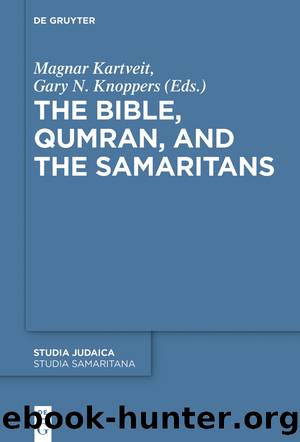The Bible, Qumran, and the Samaritans by Magnar Kartveit & Gary N. Knoppers

Author:Magnar Kartveit & Gary N. Knoppers
Language: eng
Format: epub
Publisher: Walter de Gruyter
Published: 2018-02-15T00:00:00+00:00
5 Conclusions
The conclusions may be summarized as follows: First, it is shown that in reference to âseparation from all foreignersâ the Ezra-tradition presupposes a very specific, exclusivistic use of the term âIsrael,â which essentially sees only the returnee-community as representatives of the Qahal YiÅrael. The decisive marker of the âforeignerâ for the intermarriage question is preeminently and for the purposes of the narrative logic ethnic-genealogically determined, but it is aimed at the cultic-religious demarcation of the Galuth-community from âthe other.â The designation of the âforeignerâ functions in the text as a cipher for a particular conflict, by which the âIsraeliteâ authors of Ezra demarcate themselves from other groups, who are defined as ânot Israel.â It has been suggested in this essay that behind the usage of the term âforeignerâ may lie other post-exilic Yahwisms, which likewise applied the âIsraelâ title to themselves positively and, when these other post-exilic Yahwisms are viewed historically, were equivalent to the Judean form of Yahwism. In particular, this Judean boundary-marking polemic may refer to the Samarian Yhwh-worshipers, because these worshipers were certainly no marginal religio-historical phenomenon in the post-exilic period (a âJewish sectâ), but instead were the most theological-historically significant form of Yahwism in the Levant heartland, outside of Judah.479 Within the ethnic fiction of the Ezra-tradition (and essentially of the entire book of Ezra-Nehemiah480), which developed concerning the question of intermarriage, the Samaritan Yhwh-community is declassified as a group that is impure, ineligible for the cult, and multi-ethnic, and consequently delegitimized as representatives of âIsraelâ; the Ezra-tradition stands in line with a tradition of âforeignerâ polemic against the Samaritans that continues up to the modern period.481
The concrete cause for the sharp polemic of the Ezra-story is the situation that the (Judean) authors stand against a denomination of âIsraelâ that was in every way comparable to the post-exilic Yahwism of Jerusalem. The Samaritan Yhwh-worshippers likewise understood themselves as âIsrael,â were perceived as such from outside, shared a âcommon Pentateuchâ with Judah and operated their own central Yahwistic sanctuary. Literarily and ideologically, a clear, restrictive boundary between the two denominations of âIsraelâ was drawn over the polemic. Only through the discrediting of the Samaritan Yhwh-cult could the exclusive legitimacy and therefore the justifiable uniqueness of the Judean Yhwh-faith (particularly that of the Jerusalem Temple) be ensured.
In the idealistic reconstruction of the restoration of this âIsrael,â which within the Ezra-story ultimately experiences its normative founding in the recapitulation and promulgation of the Torah (Ezra 7),482 the grounds may be sought for the fact that the Gerizim community is never explicitly mentioned, and a cipher is used. The claim is developed in the texts that the Torah â as essential spiritual center483 of the Jerusalem community â unrestrictedly serves to decipher all political religious and social questions, and as an authoritative medium possesses an undisputed significance. Because the Torah does not (explicitly) mention the Samaritans or the Gerizim community as an individual group or âpeople,â484 these terms are also not available to the Ezra-community. One is reliant on
Download
This site does not store any files on its server. We only index and link to content provided by other sites. Please contact the content providers to delete copyright contents if any and email us, we'll remove relevant links or contents immediately.
| Exegesis & Hermeneutics | New Testament |
| Old Testament |
The Five People You Meet in Heaven by Mitch Albom(3561)
The Secret Power of Speaking God's Word by Joyce Meyer(3182)
Real Sex by Lauren F. Winner(3014)
Name Book, The: Over 10,000 Names--Their Meanings, Origins, and Spiritual Significance by Astoria Dorothy(2979)
The Holy Spirit by Billy Graham(2944)
0041152001443424520 .pdf by Unknown(2843)
How The Mind Works by Steven Pinker(2813)
ESV Study Bible by Crossway(2774)
Ancient Worlds by Michael Scott(2682)
Churchill by Paul Johnson(2578)
The Meaning of the Library by unknow(2565)
The ESV Study Bible by Crossway Bibles(2550)
The Gnostic Gospels by Pagels Elaine(2527)
MOSES THE EGYPTIAN by Jan Assmann(2412)
Jesus by Paul Johnson(2352)
City of Stairs by Robert Jackson Bennett(2347)
The Complete Dead Sea Scrolls in English (7th Edition) (Penguin Classics) by Geza Vermes(2277)
The Nativity by Geza Vermes(2227)
Ancient Near Eastern Thought and the Old Testament by John H. Walton(2223)
